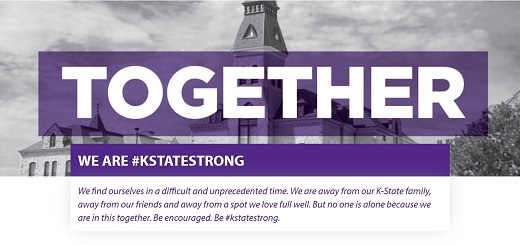05/06/20
K-State Current - May 6, 2020
K-State Current is a weekly news update for the Kansas Board of Regents to apprise the Regents on a few of the many successes and achievements made by K-State faculty, staff and students.
K-State News
Visit K-State’s “We Are #KStateStrong” site to view brief videos designed to keep the K-State family engaged, connected and inspired during these challenging times.
K-State expands licensing agreement for COVID-19 antiviral treatment
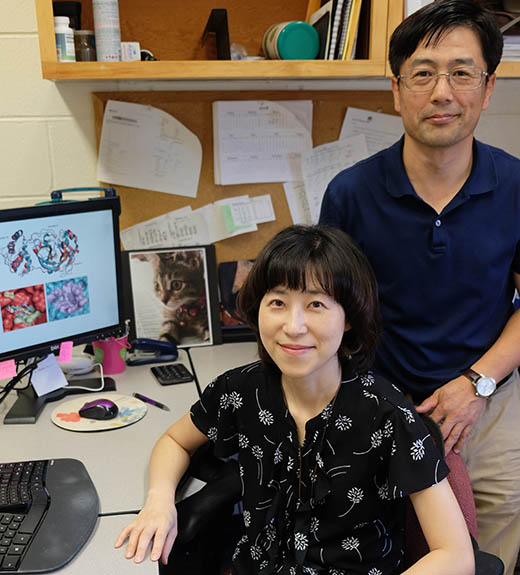 Researchers from Kansas State University are doing their part to help discover a treatment for COVID-19 through a second licensing agreement with Cocrystal Pharma.
Researchers from Kansas State University are doing their part to help discover a treatment for COVID-19 through a second licensing agreement with Cocrystal Pharma.
The new agreement with Cocrystal grants the use of two patented series of protease inhibitors developed by Kyeong-Ok "KC" Chang and Yunjeong Kim, virologists in the K-State College of Veterinary Medicine. Collaborators include William Groutas, a medicinal chemist at Wichita State University, and Stanley Perlman at the University of Iowa.
Through the new agreement, Cocrystal Pharma, a clinical-stage biotechnology company, will use the K-State-patented protease inhibitors to further develop a possible treatment of the coronavirus infection that causes COVID-19.
"Protease inhibitors bind and block the function of the virus protease," Kim said. "Those virus proteases are essential enzymes for virus replication. So if you bind and block them, then the virus cannot replicate anymore."
According to Kim, there are many steps that must be taken to push these compounds to the next level. Cocrystal will move forward with the preclinical research on the patented compounds and may enhance or further optimize them. The company will then complete additional steps such as pharmacokinetics and eventually clinical trials. The ultimate goal is that one of the compounds will become a drug that can be licensed by the Food and Drug Administration as a possible treatment.
"We are very excited about the potential outcome but we are well aware that there are many obstacles ahead," Chang said.
A previous licensing agreement with the company included broad-spectrum antiviral compounds with a focus on norovirus and Middle East Respiratory Syndrome, known as MERS. The newly licensed technologies include broad-spectrum antiviral compounds with a specific focus on coronavirus, including SARS-CoV-2, which causes COVID-19.
"Drs. Chang and Kim have been working on antivirals and inhibitors for SARS and MERS at K-State for a number of years, so discoveries related to corona and noroviruses are really not surprising," said Peter K. Dorhout, vice president for research at K-State. "Some of the discoveries they’ve made about treating fatal feline coronavirus translate nicely into understanding the current SARS-CoV-2 virus, emphasizing the important, critical connection between basic virology research on animal and human diseases."
Face time: K-State projects creating face shields, cloth masks
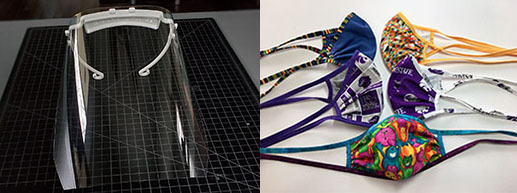 A 3D-printed face shield, left, made by student members of the Kansas State University Digital Fabrication Club, and face masks made by volunteers through a project led by K-State.
A 3D-printed face shield, left, made by student members of the Kansas State University Digital Fabrication Club, and face masks made by volunteers through a project led by K-State.
Area health care organizations are getting custom-made face shields and cloth face masks to help prevent the spread of COVID-19, courtesy of Kansas State University.
College of Architecture, Planning & Design students are 3D-printing face shields, while the Department of Interior Design and Fashion Studies in the College of Health and Human Sciences has teamed up with the K-State Office of Community Relations and Department of Environmental Health and Safety for a project to sew face masks.
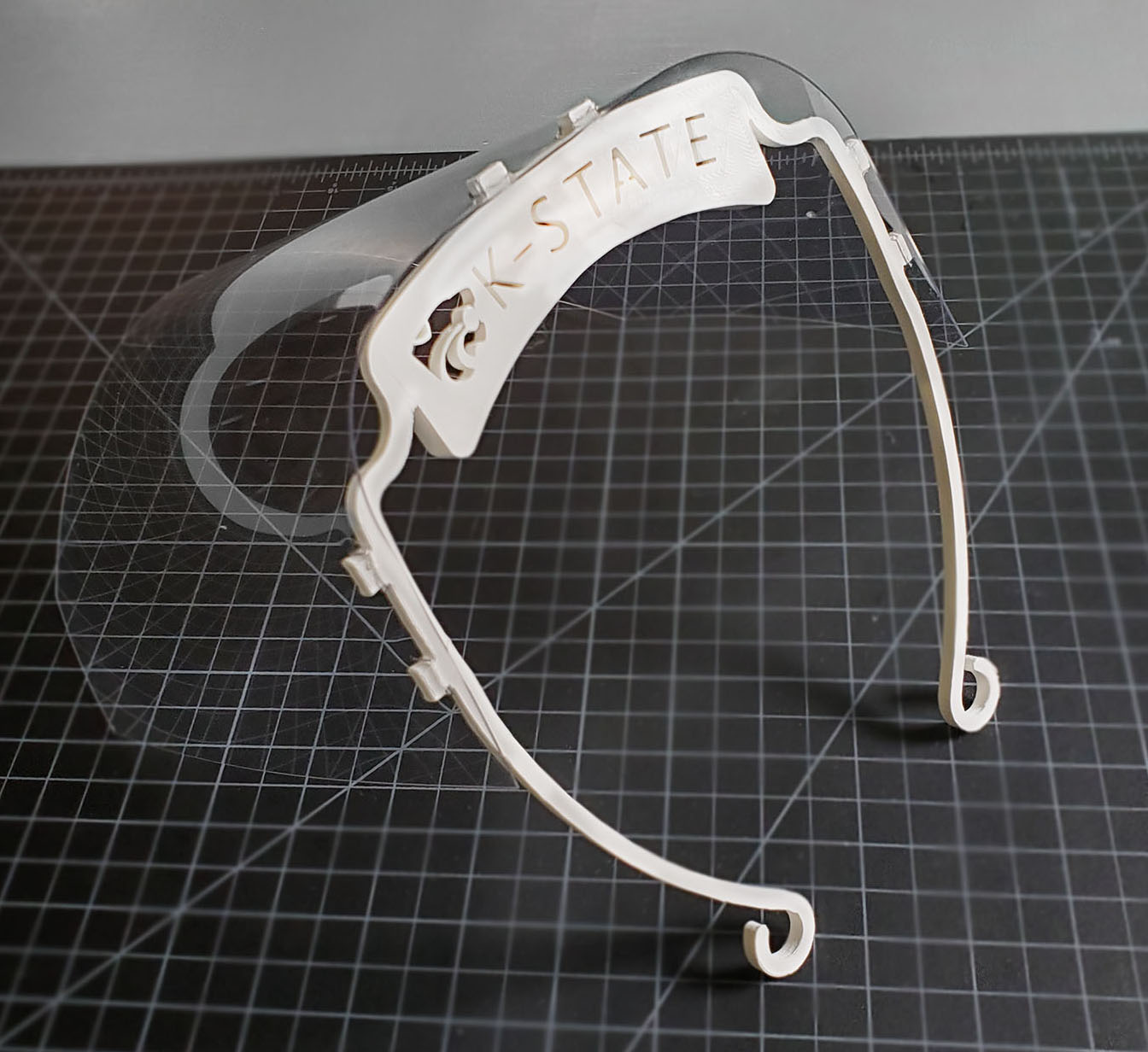 The face shields are being made by students in the Digital Fabrication Club, or DigiFab Club. The students are under the direction of Jonathan Dessi-Olive, assistant professor of architecture. The shields feature the K-State Powercat and the word "K-State." Based on an open-source design plan, the shields are produced using the college's 3D-printing and laser-cutting resources.
The face shields are being made by students in the Digital Fabrication Club, or DigiFab Club. The students are under the direction of Jonathan Dessi-Olive, assistant professor of architecture. The shields feature the K-State Powercat and the word "K-State." Based on an open-source design plan, the shields are produced using the college's 3D-printing and laser-cutting resources.
"We have four printers up and running and are able to produce around 30 shields a day, barring any temporary printer breakdowns," said D.J. Plankinton, architecture student from Wamego and president of the DigiFab Club.
The frames of the shields are made out of PLA plastic and their front covers are made from sheets of clear acetate. The shields are disinfected after they are made, according to club member Matt Cox, architecture student from Southlake, Texas.
The club has made 175 face shields so far and demand for them is high.
"So far we have distributed 130 shields to local health care facilities from Junction City to Lawrence," said club member Aubry Sittner, architecture student from Tonganoxie. "We've even gotten requests from the hospital in Hoxie and as far away as Florida."
Grant Delka, interior architecture and industrial design student from Topeka, said the club is filling orders as quickly as it can, prioritizing requests from health care organizations.
Club members said they were inspired to get involved when they saw similar efforts from academia and professional practices in the architectural community.
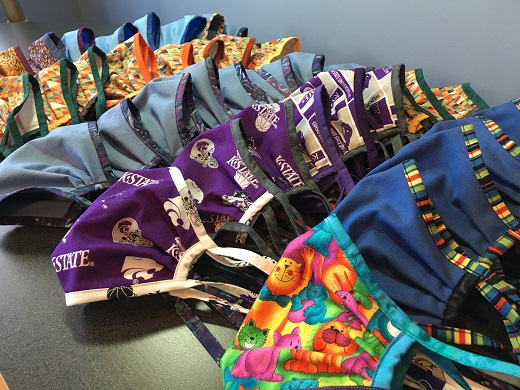 Sherry Haar, professor of interior design and fashion studies, wanted to help the Riley County Health Department and Riley County EMS with their needs for fabric face masks.
Sherry Haar, professor of interior design and fashion studies, wanted to help the Riley County Health Department and Riley County EMS with their needs for fabric face masks.
"When worn correctly and washed after each use, a fabric mask can be an additional measure to the prevention practices of social distancing, hand washing and not touching your face," Haar said.
Working with Linda Cook, K-State chief of staff and director of community relations, and Christina Aguilera, director of K-State Environmental Health and Safety, Haar got university support to draft a team of volunteer sewers to make the masks.
"We have 31 volunteers in the fabric mask sewing network," Haar said. "The requirements include advanced sewing experience; access to cotton fabric, preferably from a personal stash; and a commitment to sewing 12 masks each week for three weeks."
Most of the volunteers are from the K-State family as well as local quilting guilds. The face mask pattern has been adapted with permission from Jessica Nandino's A.B. Mask — for a Nurse by a Nurse.
"I'm so impressed with our community," Haar said. "We had 25 volunteers within two days of sending a few emails. Several of the volunteers have already made hundreds of masks for other organizations, yet continue to offer their time, resources and skills."
The sewing network also has received donated materials from area fabric stores, including Linda Lee, a K-State interior design and fashion studies alumna and owner of The Sewing Workshop in Topeka, and Liv Olsen, owner of Fenceline Fabrics and The Thrifty Notion in Manhattan. Haar and her fellow interior design and fashion studies faculty members Marla Day and Kim Hiller and student Andrada Redmond, senior in apparel and textiles from Manhattan, used the donated fabric to make the initial batch of 80 masks. The initial masks include several from K-State-themed fabrics.
Once the masks are made, Aguilera made arrangements with Cintas, the uniform-maker and business cleaning company, to have the masks sanitized and then delivered to the Riley County Health Department and EMS.
Haar said she is committed to continue the project through the summer if needed.
"With the current volunteer sewing network, there will be around 1,200 masks donated by May 1," Haar said. "New volunteers will be added as current volunteers deplete their fabric stash and finish their commitment to the project."
Haar said volunteers are still needed and can contact her at haar@k-state.edu for more information.
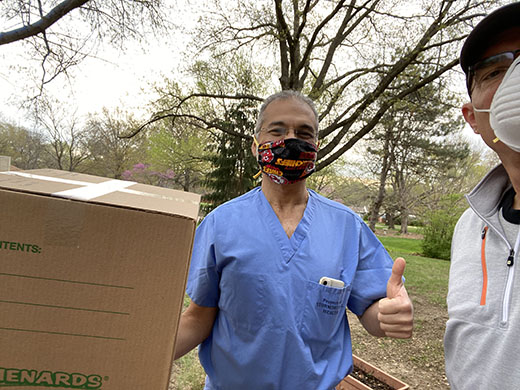 Dr. Babak Marefat, left, a member of the COVID-19 team with Stormont-Vail Health in Topeka, receives a box of 3D-printed face shields made by Kansas State University College of Architecture, Planning & Design students and delivered by the college's dean, Tim de Noble, right. Photo courtesy of Tim de Noble.
Dr. Babak Marefat, left, a member of the COVID-19 team with Stormont-Vail Health in Topeka, receives a box of 3D-printed face shields made by Kansas State University College of Architecture, Planning & Design students and delivered by the college's dean, Tim de Noble, right. Photo courtesy of Tim de Noble.
K-State Faculty Highlights
A K-State first: Plant pathologist Barbara Valent named to National Academy of Sciences
Barbara Valent, university distinguished professor of plant pathology, describes her wheat blast research in this 2019 video.
Kansas State University plant pathologist Barbara Valent has earned membership in the prestigious National Academy of Sciences, becoming the first scientist at K-State to earn the honor for original research conducted while at the university.
The National Academy of Sciences, or NAS, is considered the country's leading authority on matters related to science and technology. As a member, Valent, a university distinguished professor, joins a group of scholars that is often sought out to provide independent, objective advice to national leaders on problems where scientific insights are critical.
"Professor Valent has made, and continues to make, significant and leading contributions to understanding virulent plant diseases that impact global food production and access," said Peter K. Dorhout, K-State vice president for research. "Her research enables the world to provide greater levels of food surety and food security to its people, and it's wonderful that NAS has recognized her scientific leadership."
The academy was established by an act of Congress and signed by President Abraham Lincoln in 1863. Today, the academy has 2,405 members in the U.S. and 501 more internationally. Academy members are nominated and then elected in recognition of their distinguished and continuing achievements in original research.
"Being elected to the NAS is the ultimate recognition of scientific excellence, expertise and achievement in the U.S.," Valent said. "Even as a graduate student, you realize that being a member of the NAS is one of the highest honors a scientist can receive. It's something that always stands out there as a goal."
Valent has worked on understanding blast disease, caused by a fungus known to scientists as Magnaporthe oryzae, for more than 40 years. In the last decade, her work has focused on wheat blast, a dangerous new disease in which the fungus is capable of taking out entire wheat fields. Valent has led a research team that is driving the world's most comprehensive studies on wheat blast to keep it out of the U.S.
"When I came to K-State in 2001, I began new research on how the blast fungus hijacks and feeds on live plant cells to grow and cause disease," Valent said. "We have learned how the fungus floods surrounding cells with small proteins, or effectors, that turn off the plant's defenses and how the fungus moves from cell to cell. Understanding details of the infection process is aimed at developing novel strategies for controlling disease on rice, wheat and other cereal crops."
According to the International Maize and Wheat Improvement Center in Mexico, wheat is grown on nearly 531 million acres worldwide, or an area equivalent to that of Greenland. Nearly $50 billion is traded globally each year, and wheat-based food is eaten by an estimated 2.5 billion people in 89 countries. It surpasses maize and rice as a source of protein in low- and middle-income nations and is second only to rice as a source of calories in the human diet.
Since its emergence in Brazil in 1985, wheat blast has spread to other parts of South America. In 2016 scientists found the disease across the ocean in Bangladesh, surprising farmers and researchers and causing additional concern about its ability to spread rapidly throughout the world. Farmers in Bangledesh burned entire fields to try to stem the spread of wheat blast but the disease still established there. Many of these farmers have now stopped growing wheat.
While Valent has been in the center of international work, her team has also helped to keep the fungus from infecting U.S. wheat fields. Working in K-State's Biosecurity Research Institute, a biosafety level-3 and biosafety level-3 agriculture facility, the researchers were the first to discover a resistance gene called 2NS for wheat blast disease.
More recently, Valent — with colleagues Sanzhen Liu and David Cook — completed work showing how microbial pathogens like wheat blast are constantly evolving to overcome control measures developed by scientists.
"We are working to better understand pathogen genomics and evolution because this fungus is notorious for being able to overcome resistance," Valent said. "We need more resistance genes and that's what we're focused on now. It's a safety backup; some of the blast fungi in South America are already able to overcome the 2NS gene."
Megan Kennelly, professor and interim department head of the plant pathology department, said Valent's election to the National Academy of Sciences is a well-deserved honor.
"Her research is truly transformative, both in terms of basic understanding of plants and microbes but also with the potential to save wheat and rice yields worldwide," Kennelly said.
Kennelly noted that Valent and her group pioneered sophisticated microscopic techniques that allow them to watch and record how disease develops cell by cell and hour by hour in amazing detail.
"Her work has truly opened our eyes to the intricate interplay of plants and fungi in a completely new way," Kennelly said.
Valent was awarded K-State's highest academic ranking of university distinguished professor in 2002. She earned a doctorate in biochemistry from the University of Colorado in 1978 and was a National Institutes of Health postdoctoral fellow at Cornell University from 1980 to 1982.
In addition to her active research program, Valent has taught three K-State graduate classes and advises doctoral students and postdoctoral fellows in her lab.
"Being a member of the NAS is not just an honor but also an opportunity to impact scientific issues important for the well-being of the nation and the world," Valent said. "My expertise in fungal pathogens of important grain crops allows me to contribute to national and global food security issues including and beyond wheat blast."
She added: "As illustrated so clearly with the coronavirus pandemic, it is critical to prepare for potential pandemic threats to our food supply. It is a national security issue. Also, I have a passion for mycology, the study of fungi of all kinds. Fungi cause the most serious plant diseases, but there are also good ones with food, industrial and plant health-promoting uses. Mycologists are underrepresented among NAS members. My experience will allow me to contribute to all kinds of problems involving fungi."
One K-State faculty member, Jim Riviere, a university distinguished professor emeritus of anatomy and physiology, was elected to the National Academy of Medicine in 2003 while he was a faculty member at North Carolina State University. He joined K-State in 2012 and retired in 2017.
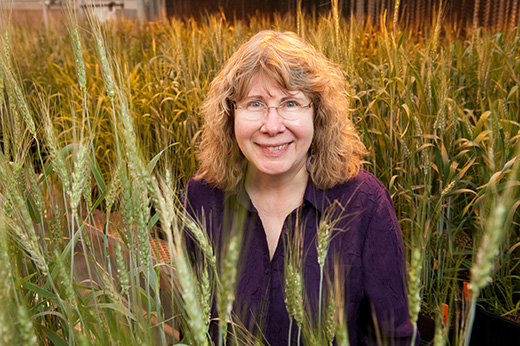 Barbara Valent, distinguished professor of plant pathology at Kansas State University, has been elected to the National Academy of Sciences.
Barbara Valent, distinguished professor of plant pathology at Kansas State University, has been elected to the National Academy of Sciences.
NSF announces CAREER award for K-State chemical engineer
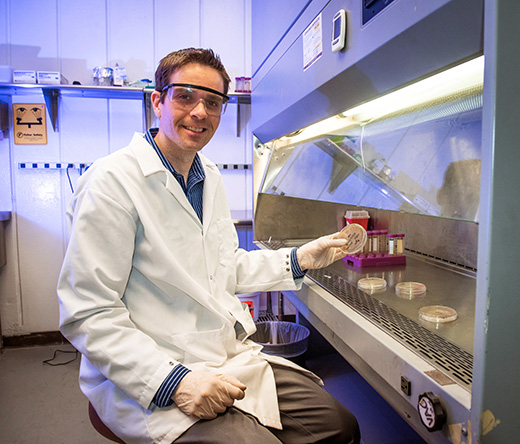 Photodegradable hydrogels have been intensively studied for application in tissue engineering and targeted drug delivery. Although these materials have been largely unexplored for use in microbiology, they have great potential for isolation of rare bacteria and on-demand delivery of therapeutic bacteria to targeted disease sites.
Photodegradable hydrogels have been intensively studied for application in tissue engineering and targeted drug delivery. Although these materials have been largely unexplored for use in microbiology, they have great potential for isolation of rare bacteria and on-demand delivery of therapeutic bacteria to targeted disease sites.
This will be the research focus of Ryan Hansen, assistant professor and Steve Hsu Keystone research scholar in the Tim Taylor Department of Chemical Engineering at Kansas State University, who has been announced by the National Science Foundation as a recipient of its CAREER award.
Jointly funded by the NSF Biomaterials Program through the EPSCoR program, Hansen will receive more than $500,000 for his project, "Understanding bacteria encapsulation, proliferation and release in photodegradable hydrogel materials."
"We will investigate the chemical and physical properties of hydrogels that lead to stable encapsulation of bacteria while keeping them alive, as well as the use of nanoparticle additives that enable controlled hydrogel degradation and bacteria release using a near-infrared light source," Hansen said.
The hydrogels will provide a new and versatile approach to isolating rare bacteria cells that show unique behavior for molecular study, enabling researchers to connect a microorganism's function with its genetic makeup.
"The project will create new research avenues at K-State in areas of human health and food safety," Hansen said, "and will produce globally minded students prepared for cross-cutting careers in materials science and microbial biotechnology."
Hansen will integrate his research into an educational plan through the Joint Microbe-Material Scholars program, which involves both undergraduate and graduate students in four areas: an international student exchange with collaborators in food microbiology; an external outreach mechanism designed to engage and recruit minority students throughout the state of Kansas; a microbe-material course that uses an interdisciplinary guided-inquiry teaching method; and public engagement.
"This joint endeavor will leverage other successful programs at Kansas State University for reaching broader audiences, including the Kansas-Louis Stokes Alliance for Minority Participation program, Project IMPACT and Science on Tap," Hansen said.
National Science Foundation CAREER awards are given in support of junior faculty who exemplify the role of teacher-scholars through research, education and the integration of education and research within the context of the mission of their organizations. The award comes with a federal grant for research and education activities for five consecutive years.
K-State Student News
Department of Defense names mechanical engineering and math student a SMART scholar
 Kansas State University's Sean Cranford, junior in mechanical engineering and mathematics, Leavenworth, has received the U.S. Department of Defense SMART Scholarship.
Kansas State University's Sean Cranford, junior in mechanical engineering and mathematics, Leavenworth, has received the U.S. Department of Defense SMART Scholarship.
The scholarship, which stands for Science, Mathematics and Research for Transformation, provides students full tuition for the remainder of their undergraduate education, a $25,000 a year stipend, medical and book fee allowances, a 10-week paid summer internship and guaranteed employment at a Department of Defense facility.
Cranford will complete his internship and post-graduation employment at the Space Vehicles Directorate at Kirtland Air Force Base in New Mexico. Research is an important part of the scholarship program and adds to a growing list of undergraduate research projects on Cranford's resume.
In summer 2019, he participated in a 10-week Research Experience for Undergraduates, or REU, at Texas A&M University, where he worked in the National Aerothermochemistry and Hypersonics Laboratory. During his sophomore year, he worked in the Nanomaterials and Characterization Lab with Zayd Leseman, associate professor of mechanical and nuclear engineering, at K-State. In summer 2018, he also participated in a 10-week Research Experience for Undergraduates at the University of Nebraska, Lincoln, where he worked in the Center for Electro-Optics and Functionalized Surfaces.
Cranford is a member of Phi Kappa Phi, Tau Beta Pi and the University Honors Program. A 2017 graduate of Lansing High School, he is the son of Ted and Lisa Cranford.
